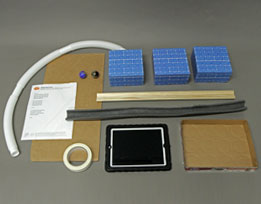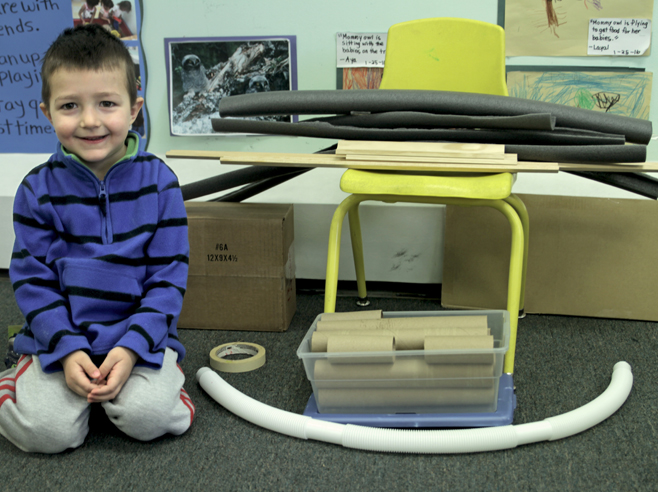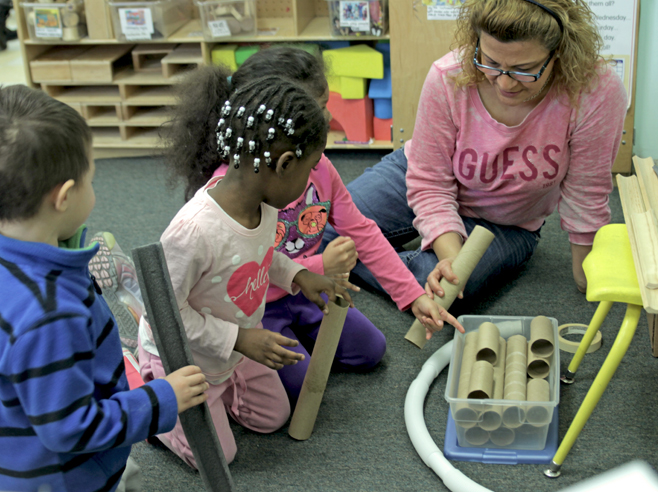Children build a long marble run pathway within a given space. They test and revise their designs and use the Slow It Down Videos tool to take a video of a marble making a successful run.
Materials

- Ramps Journal app on 1 or more iPads (Ideally, use a different iPad for each small group.)
- Materials for building pathways: foam insulation tubing, cove molding, cardboard flats, sump pump hose, cardboard tubes from paper towel and wrapping paper rolls
- Objects for propping up the ramps and pathways: blocks, chairs, cardboard boxes, etc.
- Masking tape
- Large marbles
- Projector (if available)
- Optional: Toy cars (to use instead of marbles)
- Optional: Cardboard box (to catch the marble at the end of the pathway)
- Optional: Box cutter or similar cutting tool (for the teacher to use during Preparation)
Preparation
- Cut some of the foam and cardboard tubes in half lengthwise, so you have some as tubes and some as troughs.
- Identify a good space for each group to build a large pathway. Each pathway will stay in place at least from Guided Small Group through Circle Time: Wrap-Up on the day it is built.
- Use the materials to build long marble runs yourself, so you become familiar with the construction challenges and can think about how to provide materials and tips that will help children meet these challenges. For example, the giant marble runs will begin at a high spot and end at ground level. The children will need objects of different heights to support the pathways on the way down (chairs, cardboard boxes, etc.). You may want to cut holes in some cardboard boxes so that they can more easily support the tubes of the marble run. You may also want to provide a cardboard box to serve as the end goal and cut a hole in the side into which children can insert the final section of the marble run.
- Optional: Tear off 10 to 20 pieces of masking tape (4″–6″ long each) ahead of time for children to use while building.
Directions: Lesson 12
Guided Small Group
- This culminating ramp-building project will require more time than previous Guided Small Group activities. Each group will benefit from having around 30 minutes to complete and take a video of their giant marble run.
- Tell children that they will build a giant marble run for a marble to roll down. Talk about how the marble run design needs to fit in the work space.
- Introduce children to the space they have to work in. Discuss things they need to consider in their design, such as:
- A starting point (high location) and an ending point (ground level), so children can visualize how big a pathway they might build
- A way to stop the marble from rolling away once it reaches the ending point
- Explore and discuss the building materials available to them. List uses for different materials. Tell children that there may be several good choices. Things to consider can include materials for:
- Propping up the marble run
- Making a long straight section, a steep straight ramp, a gentle straight ramp, a curved ramp
- Stopping the marble from rolling away
- Help children create a plan together for the giant marble run. You may want to split into two smaller subgroups of two to three children each. One subgroup can work on the beginning section of the marble run and the other subgroup on the end section. Or you may want to have children take turns doing different tasks: adding a new piece of track, taping it in place, testing the pathway by sending a marble down it, and so on.
- As children work, model science and engineering talk and vocabulary, and engage them in a discussion about their plans, predictions, and observations. Possible discussion ideas:
- Do you think you will start with a steep or a gentle ramp incline? Why?
- How fast do you predict the marble will move along this steep part? What about along this flat section?
- How can you make the ramp steeper? Do you think the marble will roll farther or less far?
- What force is making the marble roll down this ramp?
- In this spot, the marble keeps falling off the side of the track. What can we change so that the marble will stay on the track?
- Test the marble run. Have a child send a marble down the completed run. If it does not work, encourage children to revise their marble run. Possible discussion ideas:
- What part of your design is not working? How can you fix that part of the marble run design? Let’s change it and then test it again!
- Once the giant marble run is completed and the marble rolls along it from start to finish, invite children to celebrate their work and video-record the marble traveling along the pathway using the Slow It Down Videos tool in the digital Ramps Journal. Watch the slow-motion video and talk about the marble run. Possible discussion ideas:
- Along which sections of the pathway does the marble roll slowest? Fastest?
- Which section of the marble run was the trickiest part to build? What made it difficult? How did you solve the problem?
- Did your marble reach the finish line? Did the track fit in the space available? Did you create a way to make the marble stop rolling? Then you solved the problem!
- If possible, leave the giant marble runs up, adding signs or protective barriers as needed so the group can demonstrate how it works during the Giant Marble Runs: Demonstrations Circle Time: Wrap-Up activity.
SAFETY ALERT: Marbles can be a choking hazard to children. Make sure children understand that they are never to put marbles in their mouths. Monitor children when they are playing with marbles to ensure that they are using them responsibly and safely.


